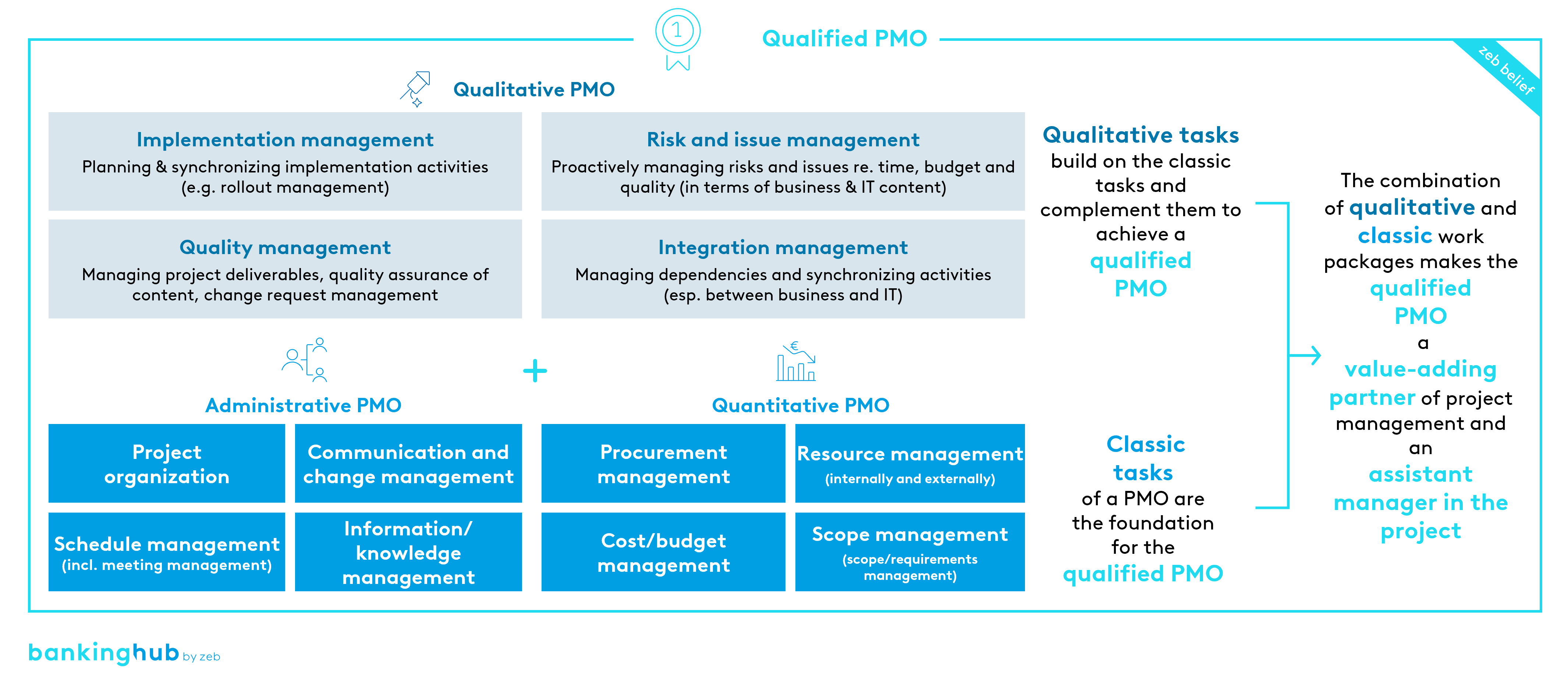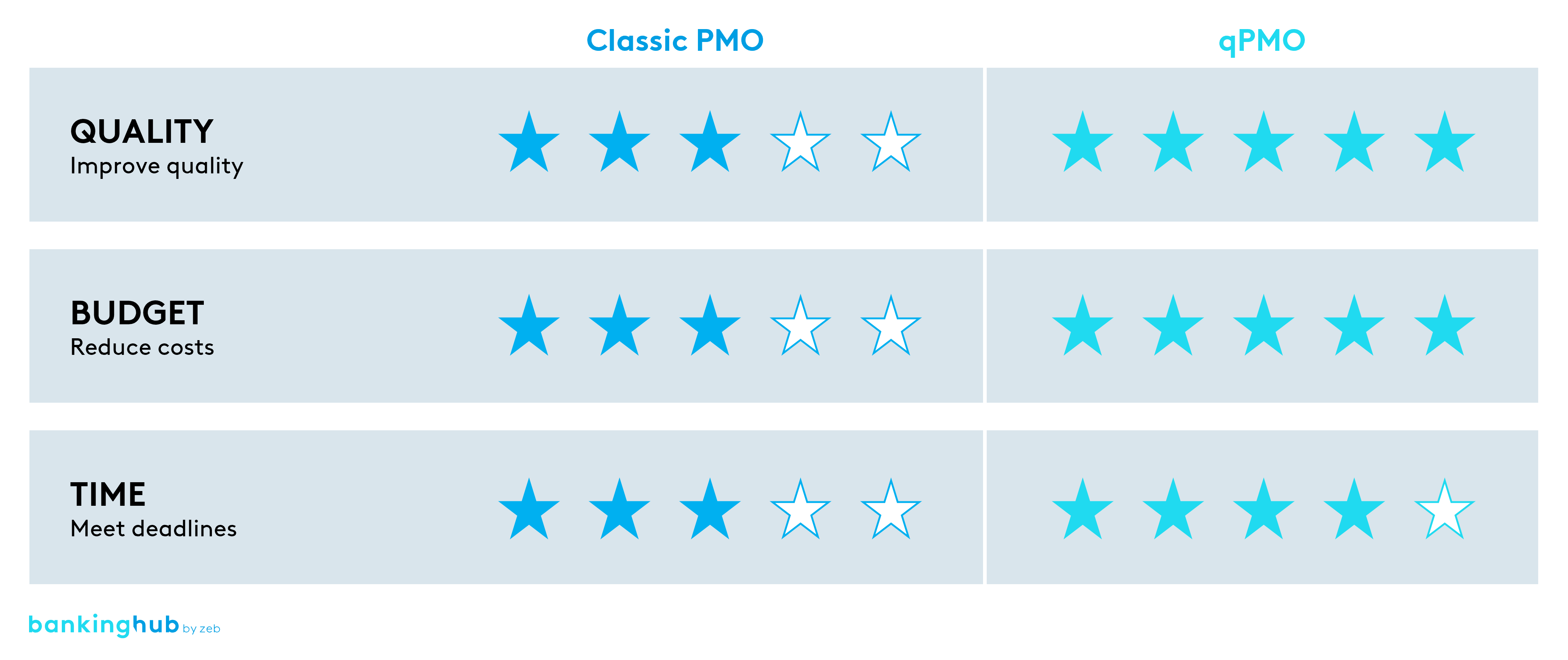|
Getting your Trinity Audio player ready...
|
Our framework for a qualified PMO
The combination of administrative and quantitative tasks is what we refer to as a classic PMO. However, it neglects essential qualitative aspects, which leads to considerable weaknesses. The qPMO we use specifically addresses these by elevating the PMO from the project administrator role to the assistant coach role, thus giving appropriate weight to qualitative tasks. As assistant coach, the qPMO actively supports the (sub-) project management and drives the project content forward.
The above-mentioned savings potential of 18 to 22% can only be achieved by adding the qualitative tasks of Implementation Management, Risk and Issue Management, Quality Management and Integration Management to the classic PMO:
- Implementation Management controls and drives progress towards the project results. This is mainly achieved by identifying (changed) requirements and measures, monitoring the implementation of all deliverables and controlling and tracking project results.
- Risk and Issue Management has the overall goal of reducing project risks. To this end, an established three-stage process is applied: firstly, identify issues, secondly, analyze the resulting risks, and thirdly, derive appropriate mitigating measures.
- Quality Management in the qPMO pursues a top-down quality approach. Based on agreed deliverables, quality gates are defined in which the individual requirements for each deliverable and their documentation are checked in detail.
- Integration Management consolidates all project results and supports their integration into the daily work of all divisions. Involving all relevant stakeholders at an early stage is the key success factor, as this is the only way to identify and resolve potential conflicts early on and to ensure that responsibilities and resources are always coordinated, even beyond project organization.
It should be noted that each project requires individual combinations and intensities, especially in the qualitative modules. Adding qualitative components is what makes the qPMO a value-adding partner of the (sub-) project management.
The four essential benefits of the qPMO
Integrating the qPMO expertise in the project work enables previously unrealized, but extremely effective benefits. The qPMO used by zeb has proven itself over many years in a wide range of projects and is characterized above all by the realization of the following four added values:
Central and comprehensive reporting
The qPMO acts as single point of truth. When actively integrated into project work, it bundles all information in the overall project and makes it available to the project members in a way that is consistent as well as tailored to their needs. Consequently, the qPMO, as the central authority of the project, is able to report at any time on the schedule, budget utilization, and qualitative status of the project.
Assuring quality
Thanks to its continuous involvement, the qPMO acts as the guardian of quality, i.e. it ensures quality by critically examining the work packages and result types along qualitative criteria. This is particularly crucial when working with several sub-projects. In this case, a central control authority ensures a uniform and consistently high level of quality.
Enhancing efficiency
As the driver of progress, the qPMO coordinates the individual project activities by providing a comprehensive and consistent timing. This way, the qPMO ensures targeted progress in line with the overall project’s schedule and avoids efficiency losses due to possible bottlenecks caused by uncoordinated activities.
Avoiding friction losses
One of the main aims of the qPMO is to stay on top and think ahead as an interdisciplinary orchestrator. Keeping in mind and controlling dependencies between project activities and sub-projects is of particular relevance to this. By adequately dovetailing the project interfaces, friction losses can be avoided and efficiency increased.
BankingHub-Newsletter
Analyses, articles and interviews about trends & innovation in banking delivered right to your inbox every 2-3 weeks
"(Required)" indicates required fields
The qPMO as a versatile game changer
Thanks to the paradigm shift from the classic PMO to a qualified PMO as a value-adding partner that brings the abovementioned benefits to project management, zeb has been able to reduce costs (budget) in numerous projects while at the same time improving quality and meeting set deadlines (time). The qPMO we use is a game changer for our clients in terms of lasting project success and can be used in classic and agile projects as well as program management.





